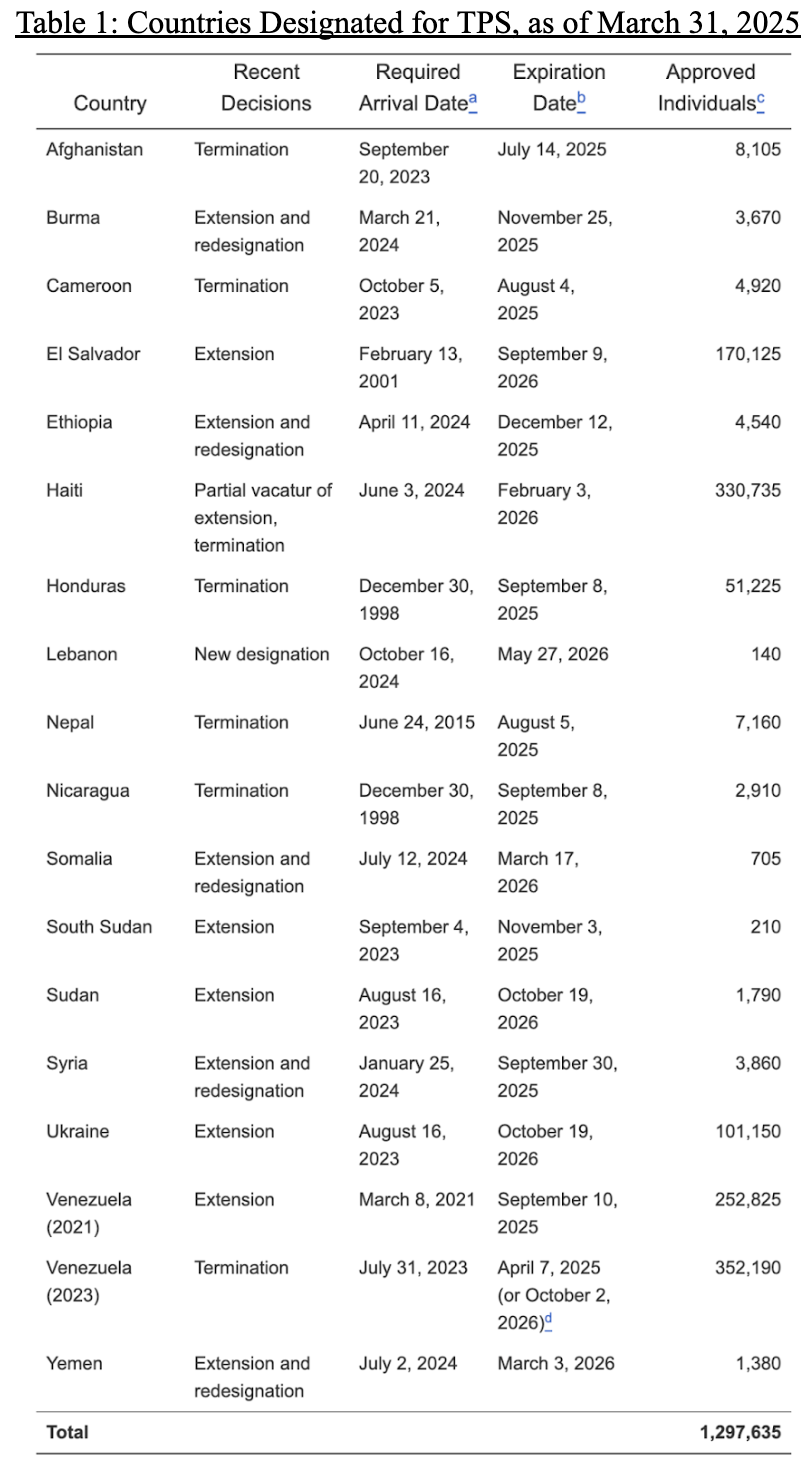USCIS Ends TPS for Some Countries
What Happened
Temporary Protected Status (TPS) program, created in 1990, permits the Secretary of Homeland Security to designate nationals of certain countries as eligible to remain in and work in the United States when returning to their home country is unsafe due to natural disasters, armed conflict, or other "extraordinary and temporary conditions.”
In July 2025, DHS and USCIS announced the termination of TPS for several countries. Most notably, TPS for Nicaragua and Honduras are scheduled to expire on September 8, 2025, after more than two decades of protection. Additionally, on July 1, 2025, Secretary Kristi Noem announced that TPS for Haiti would be terminated. The initial termination date was set for September 2, 2025, following a 60-day transition period. However, on July 15, 2025, the U.S. District Court for the Eastern District of New York (Haitian Evangelical Clergy Ass’n v. Trump, No. 25-cv-1464) blocked the termination, ruling that TPS for Haiti cannot end before February 3, 2026. Consequently, TPS protection for Haitian nationals (or stateless individuals who last habitually resided in Haiti) will continue until that date.
With respect to Venezuela, USCIS reported that, after reviewing conditions in the country, Secretary Noem determined that the 2023 TPS designation for Venezuela no longer met the required criteria and that termination was in the national interest. On September 5, 2025, however, a U.S. District Court judge in the Northern District of California issued a final order setting aside this decision, allowing the 2023 TPS designation to remain in effect. This ruling occurred despite a prior 8-1 decision by the U.S. Supreme Court in favor of DHS. As a result, beneficiaries under Venezuela’s 2023 TPS designation have their status extended through October 2, 2026, subject to ongoing litigation. DHS has expressed strong disagreement with this court ruling and is pursuing immediate relief.
Separately, Secretary Noem issued the termination of Venezuela’s 2021 TPS designation, effective November 7, 2025. The USCIS site currently lists the 2021 and 2023 TPS designations separately, indicating that the 2023 designation continues through October 2, 2026, in accordance with the court order, but remains subject to litigation updates.
What Changed
The table below provides the most current updates on TPS for four countries that are currently the most discussed and high-profile topics. The information is up to date as of September 23, 2025, but remains subject to change as DHS and the courts continue to issue new determinations. For additional details, the USCIS website can be consulted; however, it may not fully reflect the broader context or the most recent developments regarding TPS designations and terminations.
Why It Matters
For immigrants from poor and unstable countries, TPS has been a lifeline. It allows them to stay in the U.S. legally, work to support their families, and avoid returning to dangerous conditions. Ending TPS would remove these protections. Many TPS holders have established roots in the U.S.—raising children, starting businesses, and contributing to the economy through taxes—and now face the threat of losing both their legal status and their ability to provide for their families. The repercussions extend beyond individuals, impacting communities and local economies that rely on their participation.
As shown in Table 1 as of March 31, 2025, approximately 1.3 million individuals have been approved for TPS. The termination of TPS programs—particularly for countries such as Haiti and Venezuela, which account for hundreds of thousands of beneficiaries—would have profound consequences on their lives. According to a September 12, 2025 ABC News article, the recent court ruling to maintain TPS protections for Haiti and Venezuela at least through next year has not yet been reflected accurately on official websites. The report notes that TPS holders face risks, including job loss. One court declaration described a San Antonio man detained in May who was informed he would not be released until the website was updated. Another declaration came from a TPS holder employed at an Amazon warehouse for three years, who was told by human resources that a copy of the September 5 court order and an attorney’s letter were insufficient to authorize continued employment.
The reality is that the combination of program termination threats and ongoing uncertainty is already having a devastating effect on TPS holders. The lack of clarity about the program’s future is directly contributing to job losses and heightened instability among these individuals.
Broader Significance
As shown in Table 2, as of September 30, 2024, the largest populations of TPS holders reside in Florida (357,895), Texas (124,710), New York (86,665), California (72,585), New Jersey (39,020), and Georgia (41,325). These individuals make significant contributions across the nation. In 2017, it is estimated that DACA-eligible individuals paid over $2.2 billion in federal taxes, helping sustain critical entitlement programs such as Social Security and Medicare. While a smaller group, TPS holders still contributed an impressive $891 million to federal taxes.
In 2020, during the ongoing coronavirus pandemic, an estimated 131,300 TPS holders from El Salvador, Honduras, and Haiti served as essential workers, supporting the nation in roles that did not allow for remote work or sheltering in place. These individuals continued working as home health aides, repair workers, food processors, and more, exposing themselves to increased health risks.
In 2021 alone, TPS holders contributed over $2.2 billion in taxes, including nearly $1 billion to state and local governments. They also held $8 billion in spending power, which bolsters countless U.S. businesses through everyday expenditures on groceries, rent, services, and more.
Ending TPS for countries such as Haiti and Venezuela—where hundreds of thousands of individuals come not only to escape dangerous conditions but also to contribute meaningfully to the U.S. economy—would have significant economic consequences. It would harm both the nation’s economy and the lives of individuals who cannot safely return to their countries of origin due to circumstances beyond their control.




